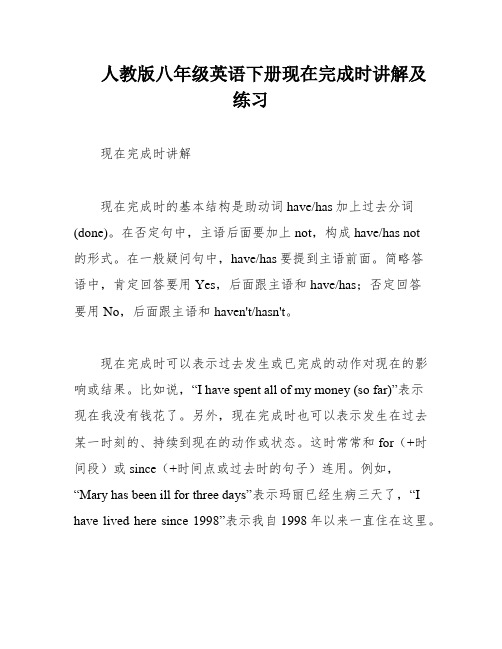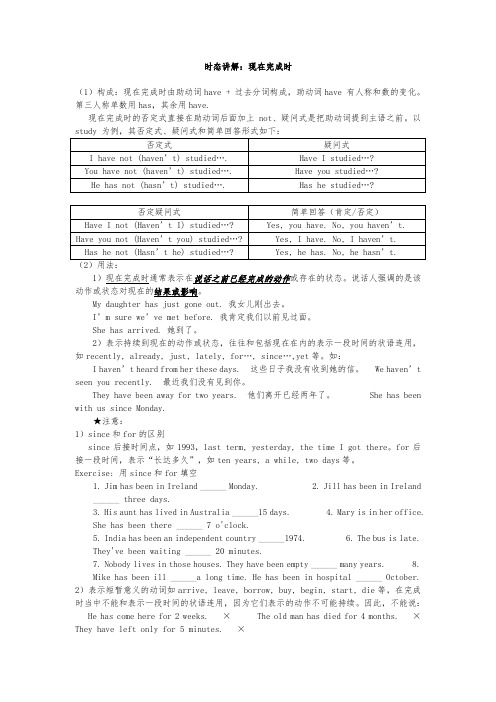人教版八年级下现在完成时讲与练
人教版八年级下现在完成时讲与练

人教版八年级下现在完成时讲与练文档编制序号:[KK8UY-LL9IO69-TTO6M3-MTOL89-FTT688]人教版八年级下册现在完成时Unit8:现在完成时可以用来表示发生在过去某一时刻的,持续到现在的动作(用行为动词表示)或状态(be动词表示)常与for(+时间段),since(+时间点或过去时的句子)连用.①for+时间段 Mary has been ill for three days.②since+过去一个时间点(译为:自从……以来)I have lived here since 1998.③since+时间段+ago I have lived here since six years ago.④since+从句(过去时) I have lived here since I was born.⑤It is+时段+since+从句(过去时)It’s six years since I lived here.(buy,die,join,come,go ,leave,join ……)不能直接与for since 连用。
要改变动词buy----have; borrow -----keep; come/arrive/reach/get to-----be in go out----be out ; leave ----be away ; begin-----be on ; finish----beover ;open----be open ; close -----be closed ; die----be dead★1.have代替buyMy brother has had(不能用has bought) this bike for almost four years.★2、用keep或have代替borrowI have kept(不能用have borrowed) the book for quite a few days.★3、用be替代becomeHow long has your sister been a teacher★4、用have a cold代替catch a coldTom has had a cold since the day before yesterday.★5、用wear代替put onb)用“be+形容词”表示一种状态,表延续性1、be+married代marry2、be+ill代fall (get) ill3、be+dead代die4、be+asleep代fall (get) asleep5、be+awake代wake/wake up6、be+gone代lose,die,sell,leave7、be+open代open 8、be closed代close/shut9、be+missing(gone,lost)代losec)用“be+副词”表示一种状态,表延续性,代终止性动词1“be+on”代start,begin 2“be+up”代get up3“be+back(to)”代return to,come back to,go back to4“be here (there)”代come(arrive,reach,get) here或go (arrive,reach,get) there等等d)用“be+介词短语”代终止性动词1.“be in/at +地点”代替go to /come to2.用be in the army 代替join the army3.“be in/at +地点”代替move toUNIT9 has gone (to),has been (to), has been (in) 的区别Have/Has gone(to) :去了(现在不在说话现场)Where is your father?He has gone to Shanghai.Have/Has been (to) :去过(已不在去过的地方)My father has been to Shanghai.Have/has been in:呆了多久(还在所呆的地方)My father has been in Shanghai for two months. /since two months ago.现在完成时讲解一.基本结构:助动词have/has+(done)二.基本句型:否定句:主语+have/has+not+过去分词+其他.一般疑问句:Have/Has+主语+过去分词+其他.简略答语: Yes, 主语 + have/has.(肯定) No, 主语 + haven't/hasn't.(否定)三.现在完成时的标志现在完成时的含义之一是过去完成的动作对现在仍有影响,用以下四大标志词可以表达这种含义:* 以already, just和yet为标志He has already got her help. 他已得到她的帮助。
英语人教版八年级下册现在完成时(The present perfect tens

现在完成时(The present perfect tense )复习要点:1.现在完成时的构成2.不规则过去分词的构成。
3.现在完成时连用的时间状语4.Have、has been与have、 has gone比较5.短暂性动词与延续性动词转化。
复习导航:一、现完成时的构成 have/has+动词的过去分词二、现在完成时的主要用法(一)表示过去发生的动作或事情,对现在产生一定的影响和结果。
时间状语:already,ever,never,before,lately,recently,just,yet.跟踪练习:1.A: ______ your brother _________ a new watch? (buy )B: Not yet.2. A: _______ you ever _______ to the park?B: Yes, I have.3. I ______ never ______ of anything like that.4. Tom ___________ in the factory since he left school ten years ago.5. He___________ already ______ a job.(二)、表示从过去某一时刻开始并一直延续到现在的动作或事情,并且有可能延续下去。
时间状语:since+时间点,for+时间段选用for和since填空:1.We haven’t seen each other ______ a long time.2.His father has been in the factory ______ 10 years ago.3.The film has been on ______ 20 minutes.4.Mr Green has worked here ______ he came to China.5.His grandparents have been dead ______ several years.6. It’s five years _______ we met last time(三)、have/has been to和have/has gone to比较Have/has been to曾经去过某地,现在已经不在那里了。
人教版八年级英语下册现在完成时讲解及练习

人教版八年级英语下册现在完成时讲解及练习现在完成时讲解现在完成时的基本结构是助动词have/has加上过去分词(done)。
在否定句中,主语后面要加上not,构成have/has not的形式。
在一般疑问句中,have/has要提到主语前面。
简略答语中,肯定回答要用Yes,后面跟主语和have/has;否定回答要用No,后面跟主语和haven't/hasn't。
现在完成时可以表示过去发生或已完成的动作对现在的影响或结果。
比如说,“I have spent all of my money (so far)”表示现在我没有钱花了。
另外,现在完成时也可以表示发生在过去某一时刻的、持续到现在的动作或状态。
这时常常和for(+时间段)或since(+时间点或过去时的句子)连用。
例如,“Mary has been ill for three days”表示玛丽已经生病三天了,“I have lived here since 1998”表示我自1998年以来一直住在这里。
现在完成时还有一些标志词,可以表达过去完成的动作对现在的影响。
这些标志词包括already、just和yet。
例如,“He has al ready got her help”表示他已经得到她的帮助,“He hasn't come back yet”表示他还没有回来。
This is the best film I have ever seen。
I have never seen a better movie before.He has never been to Beijing before。
He has never had the chance to visit Beijing.He says he has been to the USA three times already。
He has had the opportunity to visit the USA on three separate ns.So far。
现在完成时讲解与练习题(含答案)

时态讲解:现在完成时(1)构成:现在完成时由助动词have + 过去分词构成,助动词have 有人称和数的变化。
第三人称单数用has,其余用have.现在完成时的否定式直接在助动词后面加上not、疑问式是把助动词提到主语之前。
以study 为例,其否定式、疑问式和简单回答形式如下:(2)用法:1)现在完成时通常表示在说话之前已经完成的动作或存在的状态。
说话人强调的是该动作或状态对现在的结果或影响。
My daughter has just gone out. 我女儿刚出去。
I’m sure we’ve met before. 我肯定我们以前见过面。
She has arrived. 她到了。
2)表示持续到现在的动作或状态,往往和包括现在在内的表示一段时间的状语连用,如recently, already, just, lately, for…,since…,yet等。
如:I haven’t heard from her these days. 这些日子我没有收到她的信。
We haven’t seen you recently. 最近我们没有见到你。
They have been away for two years. 他们离开已经两年了。
She has been with us since Monday.★注意:1)since和for的区别since后接时间点,如1993,last term, yesterday, the time I got there。
for后接一段时间,表示“长达多久”,如ten years, a while, two days等。
Exercise: 用since和for填空1. Jim has been in Ireland ______ Monday.2. Jill has been in Ireland______ three days.3. His aunt has lived in Australia ______15 days.4. Mary is in her office.She has been there ______ 7 o'clock.5. India has been an independent country ______1974.6. The bus is late.They've been waiting ______ 20 minutes.7. Nobody lives in those houses. They have been empty ______ many years. 8.Mike has been ill ______a long time. He has been in hospital ______ October. 2)表示短暂意义的动词如arrive, leave, borrow, buy, begin, start, die等,在完成时当中不能和表示一段时间的状语连用,因为它们表示的动作不可能持续。
现在完成时讲解及练习

现在完成时讲解及练习1. 什么是现在完成时现在完成时是英语中的一种时态,用于描述过去发生的动作对现在造成的影响或结果。
它通常由助动词 "have" 或 "has" 和动词的过去分词构成。
现在完成时常用于以下情况:- 表示过去某个时间内发生的动作,并与现在有关的时刻、时间段或状况有关联。
- 表示过去开始的动作一直持续到现在,并可能继续发生下去。
- 表示过去的经历或经验对现在产生的影响。
2. 现在完成时的构成现在完成时的基本结构由助动词 "have" 或 "has" 和动词的过去分词构成。
下面是构成现在完成时的规则:- 如果主语是第一人称单数(I),则使用 "have"。
- 如果主语是第三人称单数(he/she/it),则使用 "has"。
- 其他所有人称(一般为复数形式)使用 "have"。
动词的过去分词形式主要有三种:- 以 "-ed" 结尾的动词,如 "worked"。
- 不规则动词过去分词,如 "gone"。
- 部分动词过去分词与原形一样,如 "put"。
3. 现在完成时的使用示例表示过去某个时间内的动作- I have traveled to many countries.(我去过很多国家。
)- She has read five books this month.(她这个月读了五本书。
)表示持续到现在的动作- They have lived in this city since 2005.(他们从2005年开始就一直住在这个城市。
)表示过去的经历对现在的影响- I have studied English for many years, so now I can speak it fluently.(我学了很多年英语,所以现在我能够流利地说它。
人教版八年级英语下册Unit 10 现在完成时精讲精练

八下unit 10 现在完成时精讲精练表示从过去已经开始持续到现在的动作或状态,可以和表示“从过去某一时刻延续到现在的一段时间状语”连用,如“for + 时间段”、“since + 过去时间点”、“since + 过去时的从句”、“since + 一段时间+ ago”。
且for与since引导的时间状语可以相互转换。
一、含since 或for 的现在完成时某些动词的现在完成时可表示过去某一时间开始并一直持续到现在的动作或状态,常与“for + 时间段”、“ since+过去的时间点或从句”或“since + 时间段+ago”连用。
He has worked here for over twenty years.He has learned about 5,000 English words since he went to college.She’s been at this school since five years ago.二、现在完成时中的谓语动词在现在完成时中,与“for + 时间段”、“since + 过去的时间点或从句”或“since+时间段+ago”连用的动词必须为延续性动词。
常见的延续性动词有have,live,teach,learn,work,study ,know 等;常见的非延续性动词(词组)有come,go,leave,start,die,finish,become,join,buy,get married 等。
1. 转换为相应的延续性动词,用于现在完成时。
borrow — keep buy — have put on — wearcatch a cold — have a cold get to know — knowget to sleep — sleep2. 转化为“be + 形容词/副词/介词/名词”begin / start — be on go out — be out close — be closedopen — be open get to/arrive/reach — be (in)die — be dead leave — be away finish — be overfall sleep — be asleep join — be in/be a member ofbecome — be make friends — be friendscome/go — be + 相应的介词短语达标检测一.单项选择。
现在完成时讲解和练习(有答案)
现在完成时讲解和练习1. 现在完成时的构成: have\has+过去分词(过去分词的构成有规则变化和不规则变化)2. 现在完成时的四个基本句型肯定句He has finished the work.一般疑问句Has he finished the work 回答Yes ,he has. No, he hasn’t.否定句He has not finished the work.特殊疑问句What has he done3.现在完成时的用法:A.表示过去发生或已经完成的动作对现在造成的影响或结果,强调对现在造成的影想或结果)。
例如:Thecarhasarrived.车子来了。
(结果:车子已在门口)Someonehasbrokenthewindow.有人把窗户打破了。
(结果:窗户仍破着)B.表示过去已经开始,持续到现在的动作或状态,可以和表示从过去某一时刻延续到现在(包括“现在”在内)的一段时间的状语连用,如for+时间段、since+过去的时间点、疑问词howlong等。
例如:Myunclehasworkedatthisfactoryforfiveyears.我叔叔在这个工厂工作已经五年了。
Mr.BlackhaslivedinChinasince2002.自从2002年Mr.Black一直住在中国。
Howlonghaveyoubeenhere你来这里多久了4. 在下列情形下用现在完成时(1)九词语①already已经肯定句中或句尾.: I have already found my pen.= I have found my pen already.②yet已经否定句和疑问句句尾.:I have not finished the work yet.Have you bought a computer yet ③ever曾经句中.:Have you ever seen pandas④never从不句中.:I have never been to Beijing.⑤just刚刚句中.:I have just done my work.⑥before以前句尾.:I have never been there before.⑦so far到目前为止.:So far he has learnt 200 words.⑧how long多久.:How long have you lived here⑨how many times多少次.:How many times has he been to Beijing(3)三词组<has>gone to去了某地表示“已经去了某地,在去那里的途中或到达那里还没有回来”.:He has gone to Beijing (去了北京)<has>been to去过某地表示“曾去过某地,已经从那里回来了”.:He has been to Beijing. (去过北京)<has>beenin表示“在某地呆多长时间”,常与表示一段时间的状语连用,如:since,for,howlong .: Mr.BrownhasbeeninBeijingforthreedays.布朗先生来北京已经有三天了4.如果句子里面没有时间状语,汉语意思能够加“已经”,往往用现在完成时态。
现在完成时及现在完成进行时讲解与习题
八下现在完成时与现在完成进行时现在完成时讲与练一.现在完成时的构成:现在完成时由助动词have(has)+动词的过去分词构成。
has 用于第三人称单数,have 用于其他各种人称. 二.现在完成时的概念和用法(其用法主要有三种)I.“已完成”用法 :表示一个过去发生并结束的动作对现在造成的影响或结果。
这一类情况可以细致分为下述两种情况。
1)表示开始于过去的动作刚刚结束。
常和just ,now ,already ,yet ,not…yet 等不确定的时间状语连用。
Li Ming has just turned off the light. 李明刚刚把灯关上。
(说明现在灯关上了)I've finished my homework now. 现在我已经做完作业了。
(说明可以交作业或做别的了)2)表示过去动作的结果,现在仍残留着。
一般不用时间状语。
I have lost my pen. 我把笔丢了。
(说明过去某时丢的,现在我还没找到这支笔)She has become a teacher. 她已经当了老师。
(说明她现在仍是老师)II.“未完成”用法。
表示动作或状态从过去某时开始,持续到现在,可能继续下去,也可能刚刚结束。
常和表示一段时间的状语连用。
如today ,this week (month ),lately ,recently ,these days ,in the past few days ,during the last two weeks ,since ,since yesterday ,since 2 days ago ,since 1991,for a long time ,for a month ,so far ,up to now ,till (until )now 等。
He has lived here for 30 years. 他住在这儿三十年了。
(现在还住在这儿)They've known each other since childhood. 他们从小彼此相识。
人教版英语八年级下册 Unit 9 现在完成时讲解及练习
八下unit 9现在完成时(二)语法讲练含been, ever, never的现在完成时,been是be动词的过去分词,ever(曾经),never(从不,未曾)一般作副词。
been在完成时中,常以have been的形式出现,常见的有以下几种用法:考点1 have been to+地点考点2 当have been to后面接副词,如here, there, home时,to要省略。
变为have been here/there/home。
你去过那儿吗?”there前不加to。
考点3 have been in+组织,表示加入某组织。
He has been in the army for 3 years.他参军三年了。
考点4 have been+adj./n.呈现……状态The shop has been open for 10 years. 这家店营业十年了。
We have been friends since we were 5. 我们从5岁起就一直是朋友。
考点5 ever, never常与现在完成时连用,是现在完成时态的提示词。
ever adv.曾经;在任何时候never adv.从未—Have you ever been there?你曾去过那里吗?—No, I have never been there before. 不,我以前从未去过那里。
考点6表示过去已经开始,持续到现在的动作或状态。
此时常与“for+一段时间”或“since+过去的点时间或从句(从句用一般过去时)”以及so far(到目前为止)等时间状语连用。
I’ve lived here since 2000.自从2000年我就住在这里。
=I’ve lived here since 13 years ago.=I’ve lived here for 13 years.=It is 13 years since I began to live here.注意:①在这类句子的肯定句和疑问句中谓语动词必须用延续性动词。
新人教版英语八年级下册unit8重点讲解和练习题(无答案)
语法聚焦:现在完成时(Present Perfect Tense)1) 现在完成时的定义:(1)表示过去发生或已经完成的动作对现在造成的影响或结果。
—It’s so dark. 太黑了。
—Someone has turned off the light. 有人把灯关上了。
(2)表示从过去某一时间开始并一直持续到现在的动作或状态。
常与since+过去的时间点,for+一段时间,so far 等时间状语连用。
I have lived here for ten years.我已经住在这里10年了。
(从10年前开始,持续到现在还住这儿)I have lived here since 2003. 自从2003年我就住在这儿。
(从2003年开始,持续到现在还住这儿)2) 现在完成时的构成及句式转换:助动词have/has + 过去分词①I have finished my homework. (肯定句)②I have not finished my homework. (否定句)③—Have you finished your homework?—Yes, I have. / No, I haven’t, (一般疑问句及肯定、否定回答)现在完成时的标志:①常与just, already, yet, ever, never, before, so far 等连用,强调动作的完成,不强调动作的持续。
Have you ever been to Japan?I have just finished my homework.②for + 时间段;since + 过去的时间点;since + 段时间ago;since + 一般过去时的句子。
They have known each other for five years.Since he was a child, he has lived in England.do __________ —____________ go__________ —___________read ______ —______ see _________ —______know____________ —_____________ eat _______ —_________ forget _________ —_________write________-______ 一、根据句意或汉语提示写词。
- 1、下载文档前请自行甄别文档内容的完整性,平台不提供额外的编辑、内容补充、找答案等附加服务。
- 2、"仅部分预览"的文档,不可在线预览部分如存在完整性等问题,可反馈申请退款(可完整预览的文档不适用该条件!)。
- 3、如文档侵犯您的权益,请联系客服反馈,我们会尽快为您处理(人工客服工作时间:9:00-18:30)。
人教版八年级下册现在完成时Unit8:现在完成时可以用来表示发生在过去某一时刻的,持续到现在的动作(用行为动词表示)或状态(be动词表示)常与for(+时间段),since(+时间点或过去时的句子)连用.①for+时间段Mary has been ill for three days.②since+过去一个时间点(译为:自从……以来)I have lived here since 1998.③since+时间段+ago I have lived here since six years ago.④since+从句(过去时)I have lived here since I was born.⑤It is+时段+since+从句(过去时)It’s six years since I lived here.瞬间动词(buy,die,join,come,go ,leave,join ……)不能直接与for since 连用。
要改变动词buy----have; borrow -----keep; come/arrive/reach/get to-----be ingo out----be out ; leave ----be away ; begin-----be on ; finish----be over ;open----be open ; close -----be closed ; die----be dead★1.have代替buyMy brother has had(不能用has bought) this bike for almost four years.★2、用keep或have代替borrowI have kept(不能用have borrowed) the book for quite a few days.★3、用be替代becomeHow long has your sister been a teacher★4、用have a cold代替catch a coldTom has had a cold since the day before yesterday.★5、用wear代替put onb)用“be+形容词”表示一种状态,表延续性1、be+married代marry2、be+ill代fall (get) ill3、be+dead代die4、be+asleep代fall (get) asleep5、be+awake代wake/wake up6、be+gone代lose,die,sell,leave7、be+open代open 8、be closed代close/shut9、be+missing(gone,lost)代losec)用“be+副词”表示一种状态,表延续性,代终止性动词1“be+on”代start,begin 2“be+up”代get up3“be+back(to)”代return to,come back to,go back to4“be here (there)”代come(arrive,reach,get) here或go (arrive,reach,get) there等等d)用“be+介词短语”代终止性动词1.“be in/at +地点”代替go to /come to2.用be in the army 代替join the army3.“be in/at +地点”代替move toUNIT9 has gone (to),has been (to), has been (in) 的区别Have/Has gone(to) :去了(现在不在说话现场)Where is your father?He has gone to Shanghai.Have/Has been (to) :去过(已不在去过的地方)My father has been to Shanghai.Have/has been in:呆了多久(还在所呆的地方)My father has been in Shanghai for two months. /since two months ago.现在完成时讲解一.基本结构:助动词have/has+过去分词(done)二.基本句型:否定句:主语+have/has+not+过去分词+其他.一般疑问句:Have/Has+主语+过去分词+其他.简略答语: Yes, 主语+ have/has.(肯定) No, 主语+ haven't/hasn't.(否定)三.现在完成时的标志现在完成时的含义之一是过去完成的动作对现在仍有影响,用以下四大标志词可以表达这种含义:* 以already, just和yet为标志He has already got her help. 他已得到她的帮助。
He has just seen the film. 他刚刚看过这场电影。
He hasn't come back yet. 他还没有回来。
* 以ever和never为标志This is the best film I have ever seen. 这是我曾经看过的最好的一部电影。
He has never been to Beijing. 他从没有到过北京。
* 以动作发生的次数为标志He says he has been to the USA three times. 他说他已经去过美国三次了。
* 以so far(到目前为止)为标+beforeHe has got to Beijing so far. 到目前为止他已到了北京。
She has passed the examso far. 到目前为止她已经通过了考试。
用法:现在完成时表示过去发生或已经完成的动作对现在造成的影响或结果I have spent all of my money (so far).(含义是:现在我没有钱花了.)Guo zijun has (just/already) come. (含义:郭子君现在在这儿)My father has gone to work.(含义是:我爸爸现在不在这儿)注意:1.现在完成时不能单独与过去的时间状语连用, 如yesterday,last week, three years ago 等;2)不能与when连用2.现在完成时往往同表示不确定的过去时间状语连用现在完成时练习(一)A)选用have, has填空:1.I _______ told him the news.2.She ________ come back from school.3.You ________ won the game.B)按要求改写下列各句:4.They have bought a computer.(改成否定句)_________________________________________5.He has lost his book.(先改成一般疑问句,再作肯定与否定回答)___________________________________________________________________________________________现在完成时练习(二)一、单项选择1、Both his parents look sad . Maybe they _________what's happened to him .(呼和浩特)A. knew B. have known C. must know D.will know2、He has _______ been to Shanghai , has heA. already B.never C.ever D. still3、Have you met Mr Li ______?A. just B. ago C.before D. a moment ago4、The famous writer _____ one new book in the past two years .A. is writing B.was writing C.wrote D.has written5、—Our country ______ a lot so far .—Yes . I hope it will be even ______ .A. has changed ; well B. changed ; goodC. has changed ; better D. changed ; better6.-- -Where have you _____, Kate ---I've ______ to the bank.A. gone, goneB. been, beenC. gone, beenD. been, gone7. Her grandfather ______ for two years.A. diedB. has diedC. has been deadD. has been died8. It's six weeks ______ I met you last.A. whenB. sinceC. beforeD. for9、We ______ Xiao Li since she was a little girl .A. know B. had known C. have known D. knew10、Harry Potter is a very nice film .I_______ it twice .A. will see B. have seen C. saw D.see11、His father ______ the Party since 1978 .A. joined B. has joined C. was in D. has been in12、—Do you know him well— Sure .We _________ friends since ten years ago .A. were B. have been C. have become D. have made13、—How long have you ____ here—About two months .A. been B. gone C. come D. arrived14、Hurry up! The play __________ for ten minutes .A. has begun B. had begunC. has been on D. began15、It _____ ten years since he left the army .A. is B. has C. will D. was16、Miss Green isn't in the office . she_______ to the library .A.has gone B. went C.will go D. has been17、My parents ______ Shandong for ten years .A. have been in B. have been toC. have gone to D. have been18、The students have cleaned the classroom,A. so theyB. don’t theyC. have theyD. haven’t they19、______has Mr White been a member of Greener China since he ______to ChinaA. How soon, comesB. How often, gotC. How long, cameD. How far, arrived20、His uncle____for more than 9 years.A. has come hereB. has started to workC. has lived thereD. has left the university二、句型转换。
